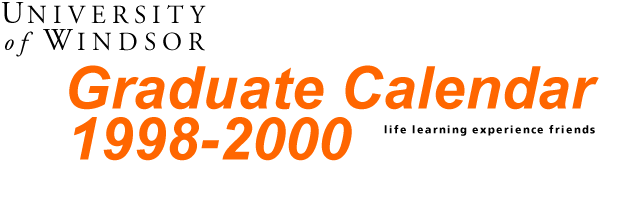

| COLLEGE OF GRADUATE
STUDIES AND RESEARCH
Structure of the College
PROGRAMS OF STUDY EconomicsEducation Engineering - General Regulations
Mechanical Engineering
English
Mathematics & Statistics
|
14
MECHANICAL
ENGINEERING
14.1.1 GRADUATE FACULTY Professors Emeriti Sridhar, Krishnaswamy; B.Sc. (Madras U.), D.M.I.T. (Madras Inst. of Technology), M.A.Sc., Ph.D. (Toronto), P.Eng.-1963 McDonald, Thomas William; B.Sc., M.Sc. (Queen's), Ph.D. (Purdue), P.Eng.—1968. Reif, Zygmunt Francis; B.Sc. (Eng.), Ph.D. (London), P.Eng.—1969. Professors North, Walter P.T.; B.Sc. (Queen's), M.Sc. (Saskatchewan), Ph.D. (Illinois), P.Eng.—1965. Rankin, Gary W.; B.A.Sc., M.A.Sc., Ph.D. (Windsor), P. Eng.—1980. Frise, Peter R.; B.Sc., M.Sc. (Queen's), Ph.D. (Carleton)—1997 Associate Professors Gaspar, Robert George Stephen; B.A.Sc., M.A.Sc., Ph.D. (Windsor)—1983. Zhang, Chao; B.Sc., M.Sc. (Xi'an Jiaotong), Ph.D. (New Brunswick)—1990. Adjunct Professor Khalighi, Bahram; B.S. (Arya-Mehr U. of Tech.), M.S., Ph.D. (Iowa)—1994. Cross Appointments Barron, Ronald Michael; B.A., M.Sc. (Windsor), M.S. (Stanford), Ph.D. (Carleton)—1975. Zamani, Nader G.; B.Sc. (Case Western), M.Sc., Ph.D. (Brown)—1986. 14.2.1 AREAS OF SPECIALIZATION Ph.D. and M.A.Sc. graduate programs in Mechanical Engineering are administered by Mechanical and Materials Engineering upon the advice of its Graduate Studies Committee for Mechanical Engineering. Ph.D. and M.A.Sc. programs are offered in the areas of Manufacturing Automation and Thermo-Fluids. Within the Manufacturing Automation area, a graduate student may concentrate upon Automotive Manufacturing Engineering by the selection of appropriate courses and the choice of the research topic. Course requirements for the Ph.D. and M.A.Sc. programs in Mechanical Engineering will be selected from the courses listed below and related courses in other programs. A student's course program will be formulated in consultation with the advisor and requires approval of the Graduate Studies Committee for Mechanical Engineering and the Chair of the Program Graduate Committee. With the permission of the advisor and Department Head, Mechanical Engineering courses with numbers greater than 449 and related to the graduate field of study may be taken for graduate credit. Not more than a total of six term hours of credit shall be allowed for the undergraduate courses offered by any department. 92-501. Transport Phenomena
92-502. Theory of Viscous Fluids
92-503. Turbulent Flow
92-505. Energy Transfer
92-506. Thermal Systems Design
92-507. Experimental Techniques in Flow Measurements
92-508. Advanced Fluid Dynamics
92-509. Multiphase, Multicomponent Flows
92-512. Automated Inspection
92-513. Experimental Stress Analysis
92-514. Mechanical Vibration
92-516. Industrial and Motor Vehicle Noise
92-517. Automated Machining
92-522. Engineering and the Environment
92-590. Directed Special Studies
92-796. Major Paper 92-797. Thesis 92-798. Dissertation |

|
©1997 University of Windsor Although care has been taken in preparing the information in this site the University of Windsor cannot guarantee its accuracy. |